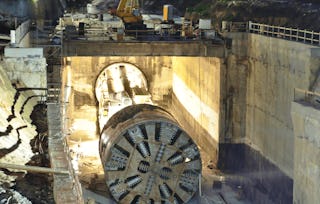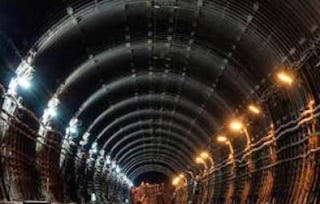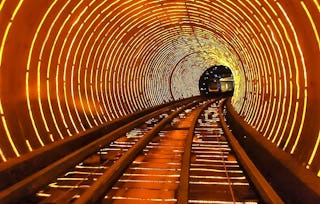The course on "Tunnel Construction Practices" provides a comprehensive and interdisciplinary exploration of tunnel engineering. Beginning with an in-depth understanding of tunnel components and the intricacies of the design process, the course covers failure types and emphasizes the critical importance of safety. It delves into various excavation methods, considering geological factors, and explores the types of supports crucial for tunnel stability. The modules further cover design methodologies, instrumentation, monitoring strategies, and the application of tunnel boring machines. Through a holistic approach, learners gain practical insights into the planning, design, and construction of tunnels, ensuring a well-rounded skill set for successful and safe tunnel construction practices. This course is majorly for consumption in the Indian subcontinent and the target audience are undergraduate and post graduate students, faculties and freshers who has entered the industry as young professionals.

Tunnel Construction Practices

Tunnel Construction Practices
This course is part of Construction Practices in Deep excavations and Tunnels Specialization

Instructor: Subject Matter Expert
Included with
Recommended experience
Skills you'll gain
- Engineering Design Process
- Failure Analysis
- Environmental Monitoring
- System Monitoring
- Construction Engineering
- Civil Engineering
- Engineering Calculations
- Architecture and Construction
- Engineering Analysis
- Construction Management
- Structural Engineering
- Construction
- Safety Standards
- Engineering Practices
- Structural Analysis
- Skills section collapsed. Showing 8 of 15 skills.
Details to know

Add to your LinkedIn profile
5 assignments
See how employees at top companies are mastering in-demand skills

Build your subject-matter expertise
- Learn new concepts from industry experts
- Gain a foundational understanding of a subject or tool
- Develop job-relevant skills with hands-on projects
- Earn a shareable career certificate

There are 5 modules in this course
The module on tunnels covers essential aspects of tunnel engineering, beginning with an exploration of tunnel components and the intricate design process. It examines the various failure types that tunnels may experience and emphasizes the critical importance of tunnel safety. The module delves into diverse methods of excavation employed in tunnel construction, considering factors like geology and project requirements. Additionally, it explores the types of supports used to ensure the stability and safety of tunnel structures. Through this comprehensive approach, learners will gain a well-rounded understanding of the key elements involved in tunnel engineering, from design and construction methods to safety protocols and support systems.
What's included
9 videos1 assignment
The "Methods of Tunnel Construction" module provides a comprehensive exploration of various techniques employed in tunnel engineering. It commences with an introduction, offering foundational insights. The Cut and Cover method, emphasizing surface disruption, and the Boring method, employing advanced machinery, are discussed. The module delves into the drill and Blast method, Box Pushing, and Pipe Jacking techniques, exploring their applications and advantages. The course then covers the Shaft method, Sequential Excavation, and the unique challenges of Underwater tunnels. Learners will gain a holistic understanding of drained and undrained tunneling conditions, equipping them with the knowledge to assess, select, and implement appropriate construction methods based on project requirements and geological considerations.
What's included
6 videos1 assignment
The "Design Methodology for the Construction of Tunnels" module offers a comprehensive exploration of crucial elements in tunnel engineering. It initiates with rock mass classification, providing foundational knowledge for assessing geological conditions. The course delves into various tunnelling methods, emphasizing the New Austrian Tunnelling Method (NATM) and the Norwegian Tunnelling Method (NMT). A comparative analysis between NATM and NMT in soft and hard ground conditions enriches the understanding of their applications. Geotechnical and geological inputs are explored, guiding the design process. The module covers empirical and semi-empirical design methods, joint set analysis, and numerical approaches, culminating in support recommendations. Learners gain proficiency in applying diverse design methodologies, ensuring informed decision-making in tunnel construction projects
What's included
9 videos1 assignment
The "Instrumentation and Monitoring in Tunnel Construction" module provides a comprehensive exploration of the essential aspects associated with implementing instrumentation and monitoring systems. It initiates with an introduction, outlining the purpose of such systems in tunnel construction. The module delves into the planning process, emphasizing the strategic approach to instrumentation and monitoring. Learners will gain insights into typical geotechnical measuring systems used in underground tunnels, focusing on loads, stresses in support systems, and water pressure monitoring. Real-world application is demonstrated through a project case study, where trigger limits and a monitoring plan are discussed. This module equips participants with the knowledge and skills needed to implement effective instrumentation and monitoring strategies, ensuring the safety, stability, and success of tunnel construction projects
What's included
6 videos1 assignment
The "Tunnel Boring Machines (TBMs)" module provides a comprehensive exploration of mechanized tunnelling, beginning with a historical overview. It covers various types of TBMs, delving into essential components and the intricacies of TBM selection. The module details the stages of TBM construction, offering insights into project details and design considerations. Learners will gain proficiency in numerical modeling and analysis of TBM tunnels, along with design checks and construction impact assessments. The course addresses common problems encountered in TBM tunnelling and emphasizes effective mitigation strategies. This module equips participants with the knowledge and skills required to navigate the complexities of TBM technology, ensuring successful and efficient tunnel construction.
What's included
11 videos1 assignment
Earn a career certificate
Add this credential to your LinkedIn profile, resume, or CV. Share it on social media and in your performance review.
Instructor

Offered by
Explore more from Environmental Science and Sustainability
 Status: Free Trial
Status: Free Trial Status: Free Trial
Status: Free TrialL&T EduTech
 Status: Free Trial
Status: Free TrialL&T EduTech
 Status: Free Trial
Status: Free TrialL&T EduTech
Why people choose Coursera for their career

Felipe M.

Jennifer J.

Larry W.

Chaitanya A.

Open new doors with Coursera Plus
Unlimited access to 10,000+ world-class courses, hands-on projects, and job-ready certificate programs - all included in your subscription
Advance your career with an online degree
Earn a degree from world-class universities - 100% online
Join over 3,400 global companies that choose Coursera for Business
Upskill your employees to excel in the digital economy
Frequently asked questions
To access the course materials, assignments and to earn a Certificate, you will need to purchase the Certificate experience when you enroll in a course. You can try a Free Trial instead, or apply for Financial Aid. The course may offer 'Full Course, No Certificate' instead. This option lets you see all course materials, submit required assessments, and get a final grade. This also means that you will not be able to purchase a Certificate experience.
When you enroll in the course, you get access to all of the courses in the Specialization, and you earn a certificate when you complete the work. Your electronic Certificate will be added to your Accomplishments page - from there, you can print your Certificate or add it to your LinkedIn profile.
Yes. In select learning programs, you can apply for financial aid or a scholarship if you can’t afford the enrollment fee. If fin aid or scholarship is available for your learning program selection, you’ll find a link to apply on the description page.
More questions
Financial aid available,

